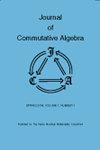通过扭转模对射影模的无扭转扩展
IF 0.6
4区 数学
Q4 MATHEMATICS
引用次数: 1
摘要
本文将P. Griffith[12]提出的一个关于阿贝群的问题推广到积分域上的模,并证明了M. Dugas和J. Irwin[2]的一个定理的类比。具有以下性质的扭转模T被刻画:如果M是无扭转模,F是一个射影子模,使得M/F ~ = T,则M是射影子模(定理4.1)。定理6.4表明,对于基数不与ω余的阿贝群,这等价于L. Fuchs和K. Rangaswamy[9]意义上的完全约简。讨论了评价域的问题,结果与阿贝尔群的情况类似。本文章由计算机程序翻译,如有差异,请以英文原文为准。
TORSION-FREE EXTENSIONS OF PROJECTIVE MODULES BY TORSION MODULES
We consider a generalization of a problem raised by P. Griffith [12] on abelian groups to modules over integral domains, and prove an analogue of a theorem of M. Dugas and J. Irwin [2]. Torsion modules T with the following property are characterized: if M is a torsion-free module and F is a projective submodule such that M/F ∼= T , then M is projective (Theorem 4.1). It is shown in Theorem 6.4 that for abelian groups whose cardinality is not cofinal with ω this is equivalent to being totally reduced in the sense of L. Fuchs and K. Rangaswamy [9]. The problem for valuation domains is also discussed, the results are similar to the case of abelian groups.
求助全文
通过发布文献求助,成功后即可免费获取论文全文。
去求助
来源期刊

Journal of Commutative Algebra
MATHEMATICS-
CiteScore
0.80
自引率
16.70%
发文量
28
审稿时长
>12 weeks
期刊介绍:
Journal of Commutative Algebra publishes significant results in the area of commutative algebra and closely related fields including algebraic number theory, algebraic geometry, representation theory, semigroups and monoids.
The journal also publishes substantial expository/survey papers as well as conference proceedings. Any person interested in editing such a proceeding should contact one of the managing editors.
 求助内容:
求助内容: 应助结果提醒方式:
应助结果提醒方式:


